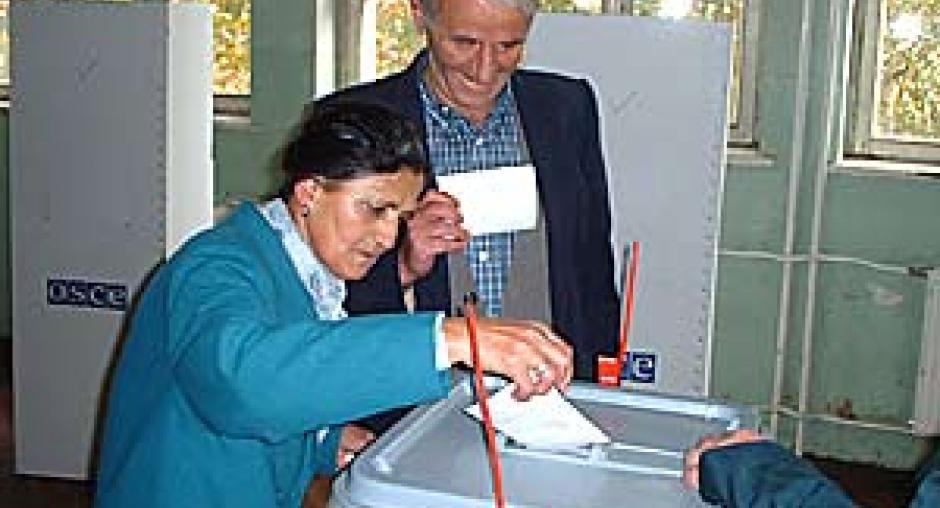Newsroom
OSCE Mission calls for an end to local political gridlock in Kosovo
PRISTINA 19 May 2003

(OSCE)Voters cast their ballot for the Kosovo
Municipal Elections on 26 October 2002. (OSCE) Photo details
PRISTINA, 19 May 2003 - In a report on the boycott within the municipal level of government in Kosovo, the OSCE Mission in Kosovo (OMiK) has told the people of the province they have a right to expect many of their local leaders to do a far better job.
Democracy is not yet up and running seven months after the last election in one third of Kosovo's municipalities - 10 out of 30 - according to the report.
"This is simply not good enough", said the Rolf van Uye, Deputy Head of OmiK. "It is encouraging to see that in some places political entities who lost in the municipal elections accepted defeat, and in those places there has been a smooth transition," he said. "Now elected representatives who are not part of a majority party or coalition need to accept their role as the opposition, and play a constructive role in municipal governments."
Political gridlock is most apparent in the municipalities of Decan/Decani, Kacanik/Kacanik, Kamenice/Kamenica, Kline/Klina, Lipjan/Lipljan, Malisheve/Malisevo, Novoberde/Novo Brdo, Suhareke/Suva Reka, Viti/Vitina and Strpce/Shterpce.
As a form of protest against the majority party, elected members of the opposition do not participate in the work of the Assembly or its committees. Each case falls into one of several patterns with a similar result - citizens are being deprived of effective representation and a functioning local government.
Elected officials are recommended to take a number of steps to overcome these political boycotts, including:
The report also recognizes that citizens and civil society also have a role to play in responsible governance by placing pressure on Assembly representatives to participate, rather than boycott, within their municipality.
Democratic society is all about debate. The OSCE, as part of its institution-building mandate, is committed to demonstrate its continued support for democratic development in Kosovo. The information in this report is part of the debate on local governance and can be used as a constructive tool to guide the political and civil institutions of society in future work.
Democracy is not yet up and running seven months after the last election in one third of Kosovo's municipalities - 10 out of 30 - according to the report.
"This is simply not good enough", said the Rolf van Uye, Deputy Head of OmiK. "It is encouraging to see that in some places political entities who lost in the municipal elections accepted defeat, and in those places there has been a smooth transition," he said. "Now elected representatives who are not part of a majority party or coalition need to accept their role as the opposition, and play a constructive role in municipal governments."
Political gridlock is most apparent in the municipalities of Decan/Decani, Kacanik/Kacanik, Kamenice/Kamenica, Kline/Klina, Lipjan/Lipljan, Malisheve/Malisevo, Novoberde/Novo Brdo, Suhareke/Suva Reka, Viti/Vitina and Strpce/Shterpce.
As a form of protest against the majority party, elected members of the opposition do not participate in the work of the Assembly or its committees. Each case falls into one of several patterns with a similar result - citizens are being deprived of effective representation and a functioning local government.
Elected officials are recommended to take a number of steps to overcome these political boycotts, including:
- A constructive dialogue among Assembly members to work on common and achievable goals;
- An approach to local governance focused on tackling and answering people's needs; and
- Political parties encouraging their elected members to participate in Municipal Assembly activities.
The report also recognizes that citizens and civil society also have a role to play in responsible governance by placing pressure on Assembly representatives to participate, rather than boycott, within their municipality.
Democratic society is all about debate. The OSCE, as part of its institution-building mandate, is committed to demonstrate its continued support for democratic development in Kosovo. The information in this report is part of the debate on local governance and can be used as a constructive tool to guide the political and civil institutions of society in future work.
